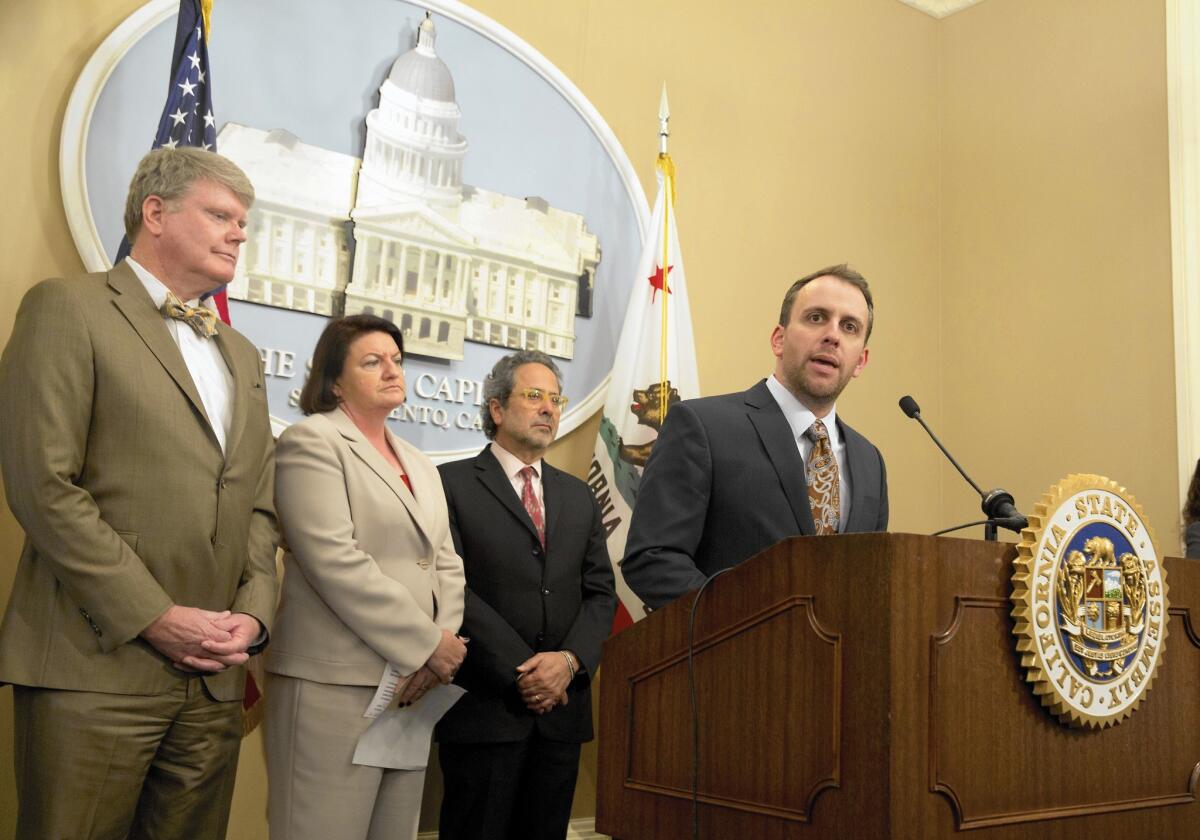Coastal Commission needs a bigger overhaul than the one sought by lawmakers

Assemblyman Marc Levine, right, discusses a bill to change the lobbying rules for the Coastal Commission. With him are co-authors Assemblyman Mark Stone, left, and Assembly Speaker Toni Atkins.
One step forward, one step back.
That’s how I’m summing up two developments involving the California Coastal Commission, which staged a clinic last week on how to insult coastal stewards, ignore the public and do its dirty work behind closed doors.
As for the step forward, the stink from that hearing in Morro Bay traveled all the way to Sacramento, where reform legislation was introduced Tuesday.
See more of our top stories on Facebook >>
As for the step back, there’s still a strong odor in Pismo Beach, which I’ll get to in a minute.
Let’s start in Sacramento, where legislators introduced a bill to turn up the lights in the sausage factory. It would require the hired guns who represent developers to register as lobbyists and play by the rules of full disclosure that apply to every other state agency.
As it is, the all-powerful players who come before the Coastal Commission represent billions of dollars worth of development projects, but they don’t have to report who they’re working for until a formal application is filed. And they don’t have to report what they’re being paid.
“The public has an incomplete record of those who make it their full-time business to influence commissioners,” said Assemblyman Mark Stone (D-Scotts Valley), a former coastal commissioner.
The bill was introduced by Stone, Assemblyman Marc Levine (D-San Rafael) and Assembly Speaker Toni Atkins (D-San Diego), who Tweeted an apology last week for the circus in which commissioners fired Executive Director Charles Lester. It seems that Lester had made the fatal mistake of enforcing the Coastal Act rather than answer the whims of commissioners intent on greater control of the agency.
Stone said he thinks the influence of these agents had something to do with the hatchet job on Lester, whom commissioners accused of being a lousy manager despite scads of tributes. Stone mentioned the notorious case of the agent/lobbyist who once bragged in emails that she was “spoon feeding” a commissioner to secure his vote on a controversial San Diego port project.
That agent would be Susan McCabe, a former coastal commissioner whose McCabe & Co. website lists 219 “Coastal Commission permit clients,” including the Hotel del Coronado, Poseidon Resources, MacPherson Oil and David Geffen.
McCabe’s company also represented a residential development in Pismo Beach known as Silver Shoals.
As I mentioned in my Sunday column some Pismo residents had issues with that proposal — which would block bay views from the highway — and supported restrictions recommended by Lester’s staff. They shared their view with Coastal Commissioner Erik Howell, who also serves as a Pismo Beach councilman.
But as Ed and Chris Henry testified at the Morro Bay hearing last week, Howell allegedly told them the staff recommendation was “dead on arrival” because the project was represented by McCabe. And on the night before the commission vote on that project, the Henrys and their friends saw Howell, McCabe and the project director dining together.
The next day, Howell voted against the restrictions and in favor of the project.
If that wasn’t galling enough, exasperated Pismo Beach residents got worked up all over again Monday evening.
The Henrys’ daughter, Lindsey, a law school grad now studying for the bar, was researching Pismo Beach campaign records and came upon an interesting item.
Less than two months before his vote on the Silver Shoals project, Howell received a $1,000 donation to his City Council reelection campaign from a person by the name of Antoinette DeVargas, according to disclosure forms filed with the state.
Who’s she?
The form lists her as an individual donor whose job is operations manager for McCabe & Co.
In the case of a campaign donation of $250 or greater, a commissioner must recuse himself for up to a year from voting on any matter involving the donor, says the commission’s chief legal counsel, Chris Pederson.
Pederson said he was unaware of the Howell situation and could not comment. So I asked the opinion of Ralph Faust, a retiree who served as the commission’s chief counsel for two decades.
“I think it’s, at best, really problematic,” said Faust, who wondered if the legal argument would be that DeVargas donated as an individual and not as an employee of McCabe & Co. “But to me, that’s really dubious.”
And to me, even if this donation was perfectly legal, that doesn’t help with the stench.
This is another reason the Coastal Commission needs a bigger overhaul than simply requiring agents to register as lobbyists.
The commissioners are appointees, but half of them hold elective office, and their fundraisers are populated by lobbyists, developers and other politicians. It’s all too cozy and too shady at the same time, and there’s little or no cross-checking between local campaign donations and potential conflicts of interest at the Coastal Commission.
“There’s not enough regulation of this,” Faust said. “It’s regulated by the [Fair Political Practices Commission], and they only investigate if someone makes a complaint. It’s not looked at closely enough.”
I have reached out to Howell, McCabe and DeVargas offering them a chance to explain their position. They did not respond to my interview requests.
So it’s not hard to understand why some Pismo Beach residents are assuming the worst.
Twitter: @LATstevelopez
MORE ON THE CALIFORNIA COASTAL COMMISSION
Editorial: Coastal Commission needs more scrutiny in the wake of dubious firing
Coastal chief’s ouster prompts bill to require transparency between lobbyists and panel
Coastal Commission, an agency with populist roots, takes heat over secret-session firing of director
More to Read
Sign up for Essential California
The most important California stories and recommendations in your inbox every morning.
You may occasionally receive promotional content from the Los Angeles Times.











